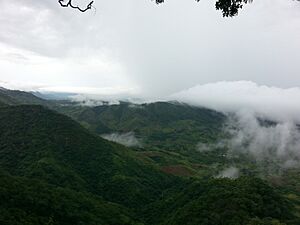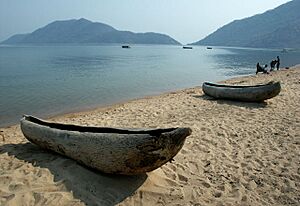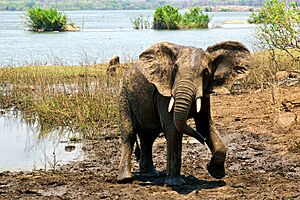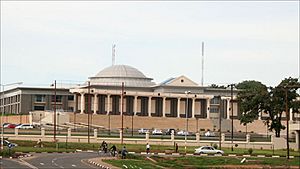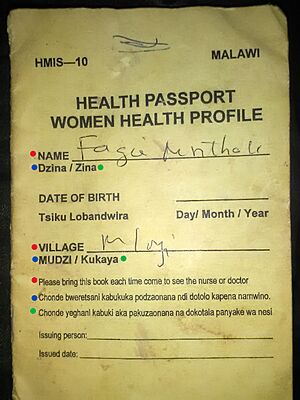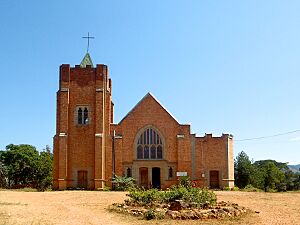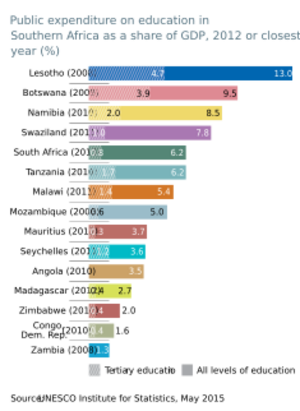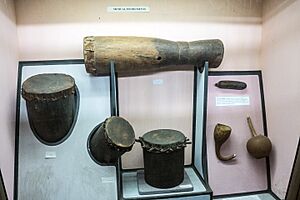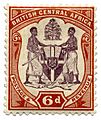Malawi facts for kids
Quick facts for kids
Republic of Malawi
Dziko la Malaŵi (Chichewa)
Charu cha Malaŵi (Chitumbuka) |
|
|---|---|
|
|
|
|
Motto: "Unity and Freedom"
|
|
|
Anthem: Mlungu dalitsani Malaŵi (Chichewa)
("O God Bless Our Land of Malawi") |
|
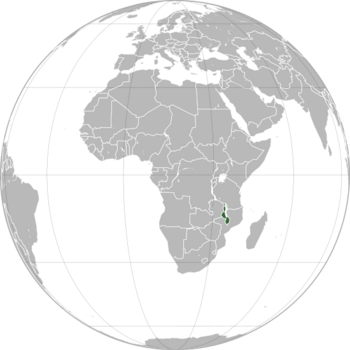
Location of Malawi (dark green) in southeast Africa
|
|
| Capital and largest city
|
Lilongwe 13°57′S 33°42′E / 13.950°S 33.700°E |
| Official languages | |
| Recognised regional languages |
|
| Ethnic groups
(2018 census)
|
|
| Religion
(2018 census)
|
|
| Demonym(s) | Malawian |
| Government | Unitary presidential republic |
| Lazarus Chakwera | |
| Michael Usi | |
|
• House Speaker
|
Catherine Gotani Hara |
| Legislature | National Assembly |
| Independence
from the United Kingdom
|
|
|
• Dominion
|
6 July 1964 |
|
• Republic
|
6 July 1966 |
| Area | |
|
• Total
|
118,484 km2 (45,747 sq mi) (98th) |
|
• Water (%)
|
20.6% |
| Population | |
|
• 2024 estimate
|
|
|
• 2018 census
|
17,563,749 |
|
• Density
|
153.1/km2 (396.5/sq mi) (56th) |
| GDP (PPP) | 2023 estimate |
|
• Total
|
|
|
• Per capita
|
|
| GDP (nominal) | 2023 estimate |
|
• Total
|
|
|
• Per capita
|
|
| Gini (2016) | ▲ 44.7 medium |
| HDI (2022) | low · 172nd |
| Currency | Malawian kwacha (D) (MWK) |
| Time zone | UTC+2 (CAT) |
| Date format | dd/mm/yyyy |
| Driving side | left |
| Calling code | +265 |
| ISO 3166 code | MW |
| Internet TLD | .mw |
|
* Population estimates for this country explicitly take into account the effects of excess mortality due to AIDS; this can result in lower life expectancy, higher infant mortality and death rates, lower population and growth rates, and changes in the distribution of population by age and sex than would otherwise be expected.
|
|
Malawi (officially the Republic of Malawi) is a country in southeast Africa. It shares borders with Tanzania, Zambia, and Mozambique. The capital city of Malawi is Lilongwe. English is the official language, and Chichewa is also widely spoken.
Malawi is one of Africa's smaller countries. It covers about 118,480 square kilometers. A large part of the country, about one-third, is covered by Lake Malawi. This beautiful country is often called "The Warm Heart of Africa" because of its friendly people.
People called Bantu people first settled in Malawi around the 10th century. In 1891, the area became a colony of the United Kingdom. It was known as Nyasaland back then. In 1964, Nyasaland became an independent country called Malawi. It was first ruled by Queen Elizabeth. Two years later, in 1966, it became a republic.
After gaining independence, Malawi was led by Hastings Banda as president until 1994. Today, Malawi has a democratic government with many political parties. The country has a small military, including an army, navy, and air support. Malawi has good relationships with many countries around the world. It is also a member of several international organizations.
Malawi is one of the world's least developed countries. Its economy mainly relies on farming. Most people live in rural areas. The country receives help from other nations. The government is working hard to improve the economy, healthcare, education, and environmental safety.
Contents
Discovering Malawi's Name
The area now known as Malawi was first called Nyasaland. This name came from the Lomwe word nyasa, meaning "lake," combined with the English word "land." David Livingstone, a famous Scottish explorer, gave it this name in the mid-1800s.
The name Malawi means "flames" in the Chichewa and Chitumbuka languages. This name was chosen by the first president, Kamuzu Banda, when the country became independent from Great Britain in 1964.
A Look at Malawi's History
People have lived in Malawi for thousands of years. The first inhabitants were hunter-gatherers. Around the 10th century, Bantu people arrived in the area. Some of these groups settled and formed different ethnic communities.
By 1500 AD, various groups came together to form the Maravi empire. This empire stretched from what is now Nkhotakota to the Zambezi River. It also reached from Lake Malawi to the Luangwa River in Zambia.
After 1600, the empire became united under one ruler. They began trading with Portuguese traders and soldiers. By 1700, the empire had split into smaller areas. In the mid-1800s, many people were forced into slavery and sold each year.
In 1859, the British explorer David Livingstone discovered Lake Malawi. He thought the Shire Highlands to the south would be a good place for Europeans to build a colony. Many British missions were set up in the 1860s and 1870s. A trading company was formed in 1878 to support these missions.
Malawi became an independent country on July 6, 1964. Hastings Banda became its first president. Malawi became a republic and a one-party state. Banda's Malawi Congress Party (MCP) was the only legal party. In 1971, Banda became president for life. He ruled for almost 30 years.
Banda helped develop farming and industries in Malawi. He built a business empire that produced a large part of the country's wealth. All the money made was used to help Malawi grow.
In 1993, people voted for a democratic government with many parties. The rule of the MCP ended. In 1994, the first multi-party elections were held. Bakili Muluzi defeated Banda in these elections.
Exploring Malawi's Geography
Malawi is a landlocked country in southeastern Africa. It is surrounded by Zambia to the northwest, Tanzania to the northeast, and Mozambique to the south. The Great Rift Valley runs through Malawi from north to south.
Lake Malawi is a very important part of the country. It forms over three-quarters of Malawi's eastern border. The lake is sometimes called the Calendar Lake. This is because it is about 365 miles (587 km) long and 52 miles (84 km) wide. The Shire River flows from the south end of the lake. It joins the Zambezi River in Mozambique.
In the mountainous areas around the Rift Valley, plateaus rise high above sea level. Some reach as high as 8,000 feet (2,400 meters) in the north. The Shire Highlands in the south are gently rolling lands. Here, the Zomba and Mulanje mountain peaks rise to 7,000 and 10,000 feet (2,100 and 3,000 meters).
Malawi's capital city is Lilongwe. Its main business center is Blantyre, with over 500,000 people. Malawi has two sites on the UNESCO World Heritage List. These are Lake Malawi National Park and the Chongoni Rock Art Area.
Malawi's climate is hot in the southern lowlands. It is more mild in the northern highlands. From November to April, it is warm with rain and thunderstorms. From May to September, there is almost no rain.
Malawi's Amazing Wildlife
Malawi is home to many different animals. You can find mammals like elephants, hippos, antelopes, and monkeys. There are also many types of birds, including eagles, parrots, and owls.
Lake Malawi is famous for its fish. It has one of the richest lake fish populations in the world. The country has five national parks and several wildlife reserves. These areas help protect Malawi's incredible nature.
How Malawi is Governed
Malawi is a unitary presidential republic. This means it has one central government and a president who leads the country. The current constitution was put in place on May 18, 1995.
The government has three main parts:
- The executive branch includes the President, who is both the head of state and head of government. There are also first and second Vice Presidents and the Cabinet. The President and Vice President are elected every five years.
- The legislative branch is called the National Assembly. It has 193 members who are elected every five years.
- The judicial branch is independent. It is based on the English legal system. It includes a Supreme Court of Appeal, a High Court, and other courts.
The Malawi Congress Party is the main ruling party. People aged 18 and older can vote in elections.
Malawi is divided into three regions: Northern, Central, and Southern. These regions are then split into 28 districts. Local government is managed by regional administrators.
Malawi's Economy
Malawi is one of the world's least developed countries. About 85% of its people live in rural areas. The country's economy mainly depends on farming. More than one-third of Malawi's total economic output (GDP) comes from agriculture. Also, 90% of the money Malawi earns from exports comes from farming products.
Farming makes up 35% of the country's economy. Industry accounts for 19%, and services make up the remaining 46%.
People and Culture of Malawi
Malawi's Population and People
Malawi has a population of over 21 million people. The population is growing quickly. It is expected to reach over 47 million people by 2050.
Malawi's population is made up of several native ethnic groups. These include the Chewa, Tumbuka, Yao, Lomwe, Sena, Tonga, Ngoni, and Ngonde. There are also smaller groups of Chinese and Europeans.
Languages Spoken in Malawi
| Languages of Malawi (1998 Census) | ||||
|---|---|---|---|---|
| Languages | per cent | |||
| Chichewa | 57.2% | |||
| Chinyanja | 12.8% | |||
| Chiyao | 10.1% | |||
| Chitumbuka | 9.5% | |||
| Chisena | 2.7% | |||
| Chilomwe | 2.4% | |||
| Chitonga | 1.7% | |||
| Chinkhonde | 0.8% | |||
| Chingoni | 0.7% | |||
| Chilambya | 0.4% | |||
| Chisenga | 0.2% | |||
| Chinyakyusa | 0.2% | |||
| English | 0.2% | |||
| Other | 1.1% | |||
The official language of Malawi is English.
Major languages spoken include Chichewa, which is spoken by over 41% of the population. Other important languages are Chitumbuka, Chinyanja, and Chiyao.
In public elementary schools, students learn in Chichewa. This language is often called the unofficial national language. However, private schools may teach in English if they follow American or British school plans.
Religions in Malawi
Religion in Malawi (2018) Christianity (77.3%) Islam (13.8%) Other or none (7.8%)
Most people in Malawi are Christian. There is also a significant number of Muslims. Other religious groups include Anglicans, Baptists, and Seventh-day Adventists.
Some people also follow traditional African religions. A small percentage of the population identifies as having no religion.
Education for Malawi's Youth
In 1994, the government made primary education free for all children in Malawi. Since 2012, primary education has been required by law. Because of this, more children are going to school. Enrollment rates for primary schools went up from 58% in 1992 to 75% in 2007.
More students are also finishing primary school. The number of students completing standard five increased from 64% in 1992 to 86% in 2006. Youth literacy, which means being able to read and write, also improved. It went from 68% in 2000 to 75% in 2015. These improvements are due to better learning materials and school buildings.
Education in Malawi includes eight years of primary school. After that, there are four years of secondary school and four years of university. Malawi has four public universities. There are also private universities.
Malawi's Culture and Traditions
The name "Malawi" comes from the Maravi people. They were a Bantu ethnic group who moved from the southern Congo around 1400 AD. Over time, different ethnic groups have blended together. There is not much conflict between them.
Malawi is known as the "Warm Heart of Africa." This nickname comes from the kind and friendly nature of the Malawian people.
The flag of Malawi has three equal horizontal stripes. These are black, red, and green. A red rising sun is on the black stripe. The black represents the African people. Red stands for the blood of those who fought for freedom. Green symbolizes Malawi's green nature. The rising sun shows the dawn of freedom and hope for Africa.
The National Dance Troupe was formed in 1987. Traditional music and dances are important. They are seen at initiation rites, marriage ceremonies, and celebrations. Malawian ethnic groups are known for their basketry and mask carving. Many of these items are sold to tourists.
Sports in Malawi
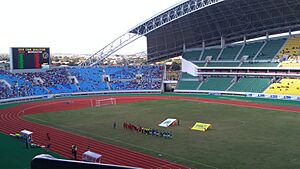
Football is the most popular sport in Malawi. It was brought to the country during British colonial rule. The Malawi national football team has played in the Africa Cup of Nations three times.
Basketball is also becoming more popular. However, the Malawi national basketball team has not yet played in international competitions. Netball has seen more success. The Malawi national netball team is ranked among the top teams in the world.
Delicious Malawian Food
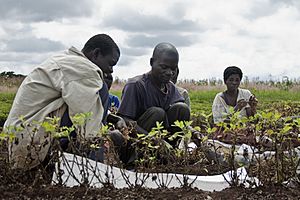
Malawian food is very diverse. Tea and fish are popular parts of the country's meals. Sugar, coffee, corn, and potatoes are also important foods.
Lake Malawi provides many types of fish. These include chambo (like bream), usipa (like sardines), and mpasa (like salmon). Nsima is a main food made from ground corn. It is usually served with meat and vegetables for lunch and dinner.
Related pages
Images for kids
-
1897 British Central Africa stamp issued by the United Kingdom
-
Malawi's first Prime Minister and later the first President, Hastings Banda (left), with Tanzania's President Julius Nyerere
-
Children attending a farmer meeting in Nalifu village, Mulanje
See also
 In Spanish: Malaui para niños
In Spanish: Malaui para niños
 | Dorothy Vaughan |
 | Charles Henry Turner |
 | Hildrus Poindexter |
 | Henry Cecil McBay |




